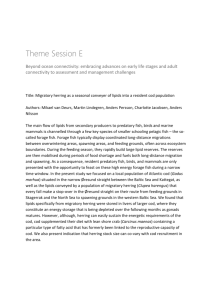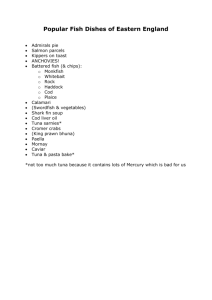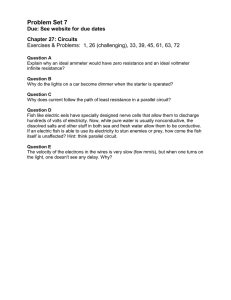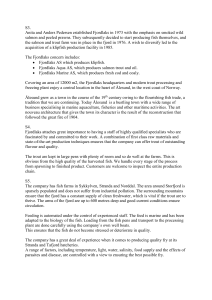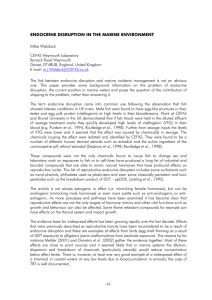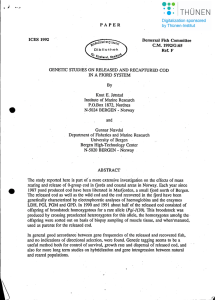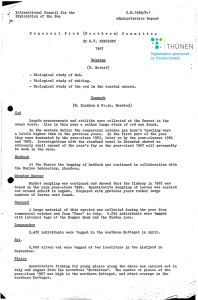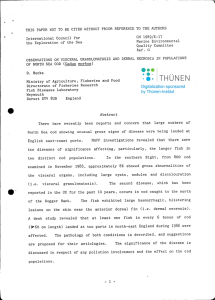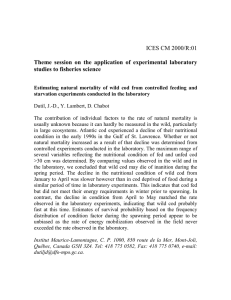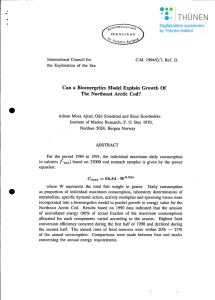Endocrine Disruption in the Marine Environment Mike Waldock
advertisement
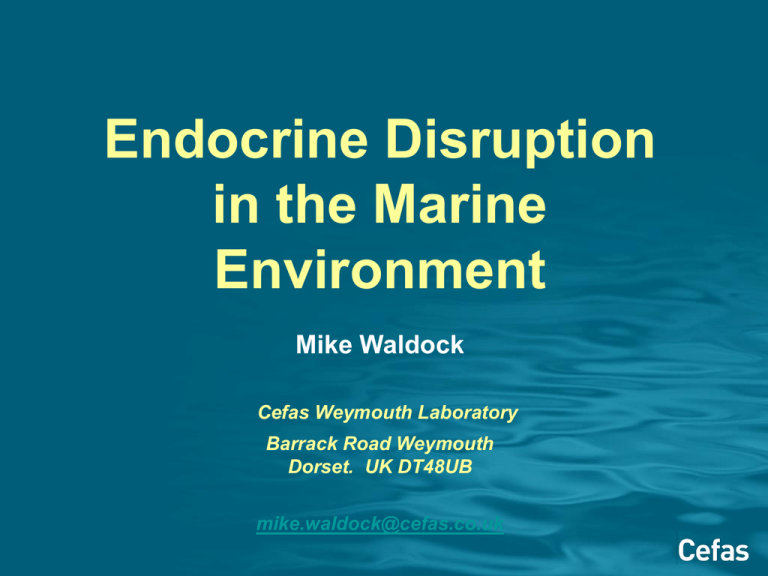
Endocrine Disruption in the Marine Environment Mike Waldock Cefas Weymouth Laboratory Barrack Road Weymouth Dorset. UK DT48UB mike.waldock@cefas.co.uk Background to EDC • First identified from eggs and sperm in the same tissue – intersex fish in UK rivers Background to EDC Measurements of Yolk protein in male fish blood 1000000 100000 10000 1000 100 10 1 0 20 40 Before 60 After 80 Identification of causative substances OH C H3 C OH C H3 CH HO OH ET HYNYL OEST RADIOL OEST RADIOL O C H3 2 HO 1.5 OEST RONE 1 0.5 0 1 2 3 4 5 6 7 8 9 10 11 12 13 14 15 16 17 18 19 20 21 22 23 24 25 26 27 28 29 30 Testing the effects on fish Vitellogenin in male trout exposed to oestrone and 17ß oestradiol 100000000 * 10000000 * 1000000 Initial Final 100000 10000 1000 100 10 C 6.25 12.5 25 50 oestrone (ng/l) 100 25 E2 25/25 oes/E2 Testing the effects on fish Testing the effects on fish Vitellogenin in Male Trout Exposed to Octylphenol and 17 ß oestradiol * 100000000 * 10000000 * 1000000 Initial Final 100000 10000 1000 100 10 C MC 1 10 OP µg/l 100 1 10 E2 ng/l 100 List of compounds Compounds: Ethyl estradiol (the pill) natural female hormones, industrial chemicals non-ionic surfactants, phthalates, bis phenol A, pesticides and biocides (metabolites DDE) Effects: Estrogens – male to female. Androgens femaleto male. Anti-androgens, anti-estrogens. Could there be a problem in the open sea? • Flounder work showing decreasing trends Tyne (Hebburn) 100000000 10000000 VTG 1000000 • Sewage related decreasing problem 100000 10000 1000 100 10 96 97 99 00 00 01 01 TBT • Antifouling on yachts 60’s- 80’s and on ships to date TBT • Good example of endocrine disruption before we called it ED. TBT NORTH SEA IRISH SEA BRISTOL CHANNEL ENGLISH CHANNEL TBT levels are decreasing and effects reducing Shetlands monitorin g by FRS ICES Workshop and Cod • Cod placed in cages At 500m from platforms – 5 fold increase in VTG in male cod At 2000m – background levels Produced water discharges • Largest wastewater stream in offshore oil & gas production (~ 340 x 106 m3 yr-1). • Complex composition: – small amounts of dispersed oil – dissolved organic compounds (including h/c) – organic acids – phenols – production chemicals – inorganic compounds ER agonists identified in PW • Isomeric mixture of C1 to C5 and C9 alkyl substituted phenols (APs). OH OH OH OH OH OH OH OH OH ni an No Platform Al b Br ae Da a lm A en No lp y rth ha S er o u n Pr th No od rd uce ic r Ap ol l Pr F oc oin o ed av ur en al Bl an k Pi pe Be r ry Sc l hi eh A al lio n Sa lti Br en re tD el ta He w O S Ba ett 48 I nf f( /2 Ra 9A m ET form AP ) (C PF Gr ) y Su pho n llo m Vo Cl e Al aym ba or No e rth er n rt An h dr A No lwy ew rth n N Co ort rm h or M ant o Fo ntr o rti es se Br M ag Mu avo nu rc h s Pr iso od n uc tio n Ni 100 • Cod work trends with age In vitro ER agonist potency (ng E2 /l) Is it enough to affect cod? 90 80 70 60 50 40 30 20 10 0 VTG in the plasma of male cod 180 160 Shetland Box 140 Iceland Irish Sea g/ml) m VTG µg/ml 120 North Sea 100 80 60 VTG ( 40 20 0 0 20 40 60 80 100 Body length (cm) Scott and Thain CEFAS (unpublished data) 120 Results to Present • Widespread induction in large cod • Lower but significant induction in prey fish – dab • Next steps to identify the causes (TIE) Conclusions • Endocrine Disruption is present in the open sea at low levels. • TBT related specifically to antifouling paint use on shipping and is being controlled • Effects on fish are unlikely to be from sewage discharges of hormones because dilution would be too great • Inputs from produced water seem to be only weakly estrogenic • The relationship with the size of the fish suggests that the effect is due to compounds bioaccumulating up the food chain
